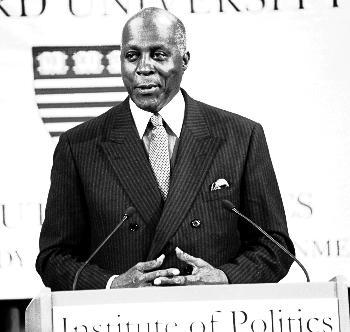
News
Cambridge Residents Slam Council Proposal to Delay Bike Lane Construction

News
‘Gender-Affirming Slay Fest’: Harvard College QSA Hosts Annual Queer Prom

News
‘Not Being Nerds’: Harvard Students Dance to Tinashe at Yardfest

News
Wrongful Death Trial Against CAMHS Employee Over 2015 Student Suicide To Begin Tuesday

News
Cornel West, Harvard Affiliates Call for University to Divest from ‘Israeli Apartheid’ at Rally
Vernon Jordan Speaks at ARCO
Prominent Clinton Adviser Recalls Civil Rights Past

Former Clinton legal advisor Vernon Jordan talked about the role of the civil rights movment in his professional success at the ARCO Forum last night.
In an address co-sponsored by Harvard’s W.E.B. Du Bois Institute for Afro-American Research and the Institute of Politics Student Advisory Committee, Jordan began by explaining the impetus for his new book, entitled Vernon Can Read!
Talking to his daughter, Vicki, motivated him, he said.
“I’d realized that she had no idea what it was like to be black in the South in 1950,” Jordan said. “I made a promise to myself that I would write of my experiences as a kid and a professional growing up in the South.”
The expansion of civil rights made Jordan’s professional ambitions possible.
Back in 1947, Jordan said, his own grandfather had not had such options available to him.
Jordan recalled his own days as a chauffeur for a retired Southern banker. His employer was shocked that Jordan was college-educated. One day, Jordan heard the surprised man tell his friend, “Vernon can read!”
Jordan expressed his gratitude for the societal shifts that had enabled him to attend college. He said he felt that his success captured the essence of the civil rights movement.
“It was about watching America change and being a beneficiary of that change,” he said.
As a former Executive Director of the United Negro College Fund, Jordan spoke of the intense pride he felt as more and more black students began to graduate from universities.
He also described his initial work with NAACP lawyers in 1960, when he was only two months out of Howard University Law School. He said he was touched by the gratitude of black families in Georgia, where he had worked on this first case.
“It was then that I understood why I wanted to be a civil rights lawyer,” he said.
When asked about the Sept. 11 terrorist attacks, Jordan drew a parallel to his own struggles.
“When we in the civil rights movement were hit with terrorism, we kept on walking up to freedom’s way,” he said. “[It’s American] to have to keep on walking.”
Jordan concluded his remarks by arguing that the civil rights movement still has a place in today’s world.
“This is still a color-conscious society,” he said. “There is much work to be done.”
Jordan has also served as President and CEO of the National Urban League. He is currently a legal counsel with the firm of Akin, Gump, Strauss, Hauer & Feld.
Want to keep up with breaking news? Subscribe to our email newsletter.
